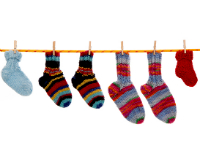Sleep: Essential for Mind-Body Health
/Adults and children alike are spending more time awake late at night to study, work, or have fun. All those late nights may be slowly killing us. More than 20 years of research shows us that sleep is vitally important to physical and mental health.
Most of what we know about sleep and health comes from studies of what happens to the mind and body when we don't sleep enough, or at all. In animal and human studies, living without sleep for even a few months resulted in death. Sleeping fewer than 8 hours a night on a regular basis is associated with increased risk for diabetes, heart disease and stroke, depression, colds and flu, and obesity.
While We Are Sleeping...
Sleep affects brain chemistry and has an important role in the functioning of the nervous, immune and endocrine systems. During sleep we develop and reinforce neural pathways involved in memory, learning, and emotion. New research suggests sleep helps flush toxins from the brain.
While we are sleeping, the body manufactures hormones that repair damage caused by stress and the environment in which we work and play. Growth hormone cleanses the liver, builds muscle, breaks down fat, and helps normalize blood sugar. We also produce hormones that help fight infections. If we aren't getting sufficient sleep, we get sick more often and take longer to recover. Lack of sleep increases inflammation, which is has been linked to heart disease and stroke.
Skimping on shut-eye is linked with obesity in adults and children. Lack of sleep interferes with the levels of ghrelin and leptin, metabolic hormones that signal when you're hungry and when you're full.
The amount of sleep you need varies based on age, activity level, quality of sleep, and genetics (e.g., some of us really are night owls). Infants typically require 14-15 hours of sleep per 24-hour period; young children about 12 hours; teens about 9 hours, and most adults 7-9 hours. A general rule of thumb for determining your sleep requirement: If you do not wake feeling refreshed, you may not be getting enough sleep.
Tips For A Good Night's Sleep
- In the sack for sleep and sex only. Regular sex can improve sleep quality so don't use your time between the sheets to deal with daily hassles--take that outside of the bedroom (or record in a journal). If you don't feel sleepy, leave the room and do something relaxing until you feel drowsy, (see my Natural Therapies for Sound Sleep in this newsletter). Then, go back to bed.
- Set a sleep schedule. This includes a soothing pre-sleep routine, such as a warm bath, reading or gentle yoga. Go to bed and wake at the same time each day. This entrains your body rhythms, making it easier to fall asleep. If you need a nap, get it in before 5:00 PM; limit to 20 minutes.
- Surround yourself with cave-like ambiance. A sleeping space should be quiet, dark, and cool (between 60-72°). If you do shift-work, use blackout shades or an eye mask. Remove electronic devices, computers and TVs from your room. Research shows that use of digital devices within an hour of bedtime has a negative effect on sleep quality.
- Let the light in early and exercise regularly. Natural light helps regulates hormones that promote ideal sleep-wake patterns. Open the curtains as early as possible and get outdoors during the day. Also, exercise during the day or early evening makes it easier to fall asleep and increases the amount of deep sleep obtained.
- Eat a Light, Last Meal of the Day. A light dinner eaten 2-3 hours before sleep is ideal. A full stomach interferes with sleep as the body works at digestion. Steer clear of spicy or fatty foods that can cause heartburn. If you need a bedtime snack, combine a carbohydrate and protein, such as almond butter on toast, Greek yogurt with granola, or hummus and veggies. Avoid products containing caffeine, sugar or nicotine as their effects can last several hours.
Are You Sleep Deprived?
You don't have to pull "all-nighters" to become sleep deprived. A sleep debt of just 1-2 hours a few nights a week can affect your health and performance.To become fully well-rested and regain energy after a sleep debt, get an extra hour of sleep each night for one week.
If you experience any of the following signs of sleep deprivation, talk to Dr. Bossio about natural approaches to getting your sleep back on track.
- Daytime drowsiness; fatigue
- Poor memory; difficulty concentrating
- Changes in appetite
- Difficulty dealing with stress
- Irritability
- Muscle tension; impaired vision
- Increase in accidents or clumsiness
Image Attribution: Phase4Photography/bigstockphoto.com






